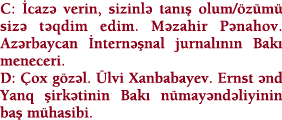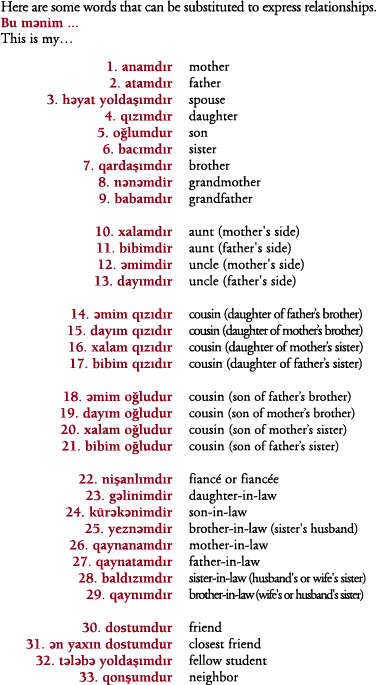
Summer 1999 (7.2)
Getting to Know You - Introductions
in Azeri
Sociolinguistically
Speaking - Part 3
by Jala Garibova and Betty Blair

Artist: Sakit Mammadov, "My World", 50 x 45
cm, oil on canvas, 1997. Contact in Baku: (99-412) 60-09-07.
See AZgallery.org
This is the third part in our linguistics series introducing language patterns to new language learners of Azeri. The social context here describes patterns practiced in the Azerbaijan Republic. Word choice and usage may be somewhat different among Azerbaijanis living in Iran.
Though it's not unusual for Azerbaijanis to initiate conversations
spontaneously with strangers in taxis, buses and at public events,
introductions are more likely to take place at ceremonies, parties
and official or unofficial gatherings. Both men or women initiate
introductions, but there's a greater tendency for men to take
the first step.
People are somewhat reticent about telling their names unless
asked, except for official purposes. It would be rare to start
a conversation with a stranger by asking his or her name. After
some sort of rapport is established, then names may be exchanged.
People usually shake hands after telling their names.
First and Last Names
To the question "What is your
name?" Azerbaijanis usually reply by telling their first
names though the family name may be added. When asked for their
full names, Azerbaijanis (as well as other nationalities of the
former Soviet Union) will usually say their last name first.
This is a Soviet pattern. But there has always been a tendency
among certain strata of society, which were more sensitive to
national identity problems, to do exactly the opposite and say
their personal names first.
When addressing a person by his or her first name, follow it
with a title. For women, use the word "khanim" as in
"Vafa khanim" which serves much like American term,
"Ms", in that it does not distinguish the woman's marital
status. For men, there are two major choices. Still "muallim"
(teacher) is frequently used, as in "Fuad Muallim"
or "Rauf Muallim". This general usage of "Muallim"
for men, regardless of whether they are teachers by profession
is a remnant from the Soviet past.
A second choice which has gained popularity since independence
is the use of "bey" for "Mr." as in "Farid
Bey". "Khanum" as well as "bey" are
historical titles in Azerbaijan. "Bey" underwent certain
restrictions during the Soviet period as it usually identified
someone of wealth or high social standing which was counter to
socialist ideology. "Bey" was replaced by "muallim"
(teacher), while "khanim" (woman) has more or less
retained its same usage and meaning throughout the century. Today
"bey" carries with it simply the meaning of "Mr."
For Azerbaijanis living in Iran, "Agha" is used for
men and followed by the last name, not the first name as in "Agha-ye
Abadi".
Titles are rarely used for young people under the age of 20-22
except for dramatic effect. People tend to be modest and not
use academic or official titles, such as Professor, Academician,
Dr., etc. (In Iran, Azerbaijanis tend to do the opposite).
What's Your Name?
Formal Pattern:
Excuse me, what's your
name?
![]()
Here the choice of
"your name" is the more polite form - 2nd person plural
pronoun and verb ending ![]() rather than the more familiar singular form which would be
rather than the more familiar singular form which would be ![]()
Informal Pattern:
A: What's your name?
B: Rena
A: Very nice. My name is Rauf.
B: Very glad (Glad to meet you).
A: Me, too.

Formal Occasions:
C: Let me introduce myself. Mazahir Panahov. Azerbaijan International's
Baku manager.
D: Very nice. Ulvi Khanbabayev. Chief Accountant of Ernst &
Young.
C: To make your acquaintance very glad.
D: Glad to meet you, too.

Introducing Someone
When introducing two people to each
other, follow these rules to show respect.
1. Younger person to older person.
2. Man to woman.
3. Relative to a non-relative.
When a person introduces his wife, the word
"my spouse" or "my lady" is usually used,
not "wife". Village people, especially old men, who
are sometimes very shy to introduce their wives are likely to
say "children's mother". And, likewise, for women who
may also use the word
"spouse" for husband or "children's father".If
the introduced person has an official title, be sure to mention
it.
E: Meet, please. Naila - my sister, Rafig - my close friend.
F: Very nice.
E: I am very glad.

G: Meet please, this is my
wife (literally "lady") Gulnar.
(To the other party being introduced): Murad bey is the head
of our department. He is Professor.
H: Very nice. Glad to meet you.
G: Me, too.

Introducing Oneself
Formally
Azerbaijanis introduce themselves
directly for official purposes. (Otherwise, as said above, they
either start a casual conversation before introducing themselves,
or wait or ask for the initiative of a third person). Unlike
Westerners who generally mention their names first, Azerbaijanis
are more likely to say the name of the organization they belong
to and then their name.
Introducing a Group
of People
When introducing a group of people
to others, the host observes a certain hierarchy.
1. Older people are introduced first.
2. People with recognized social status, contribution or position
are introduced earlier.
3. Women are generally introduced before men.
When introducing someone,
mention their special contributions professional titles and professional
qualities.
This is my cousin.
Her name is Ayan.
She is a student of the Medical University.
She is also a talented artist.
Last year her exhibition was held at the gallery.

![]()
Meeting Children
When introduced to a child, you as
the older person should continue to develop the conversation
with the child. If the child has not yet entered school, compliments
are given emphasizing how cute the child looks or how pretty
their clothing is. If the child is already enrolled in school,
questions about the child's studies and interests (drawing, music,
sports etc.) are asked.
J: What is your name?
K: Yalchin.
J: How old are you?
K: Eight.
J: Do you go to school?
K: Yes.
J: Which grade (are you in)?
K: Second.
J: Second?! So you're a big boy. What grades do you get?
K: Excellent (5), sometimes "good" (4).
J: Bravo! What a clever boy you are! But try not to get 4. Always
get 5.


Shaking Hands
Men are always shaking hands with
each other, though women are less likely to do so. When being
introduced to each other, men and women may choose whether or
not to shake hands. Sometimes they do, sometimes, they don't.
However, during formal introductions, women will shake hands
with other women or with men at the moment the names are mentioned.
Most foreigners are a bit surprised to discover that Azerbaijani
women offer a very limp handshake. This can easily be explained
because in Azerbaijani society, a woman's handshake is supposed
to show that she is demure and feminine.

From Azerbaijan International (7.2) Summer
1999.
© Azerbaijan International 1999. All rights reserved.
About Azeri | Sociolinguistically Speaking
AI Home | Magazine Choice | Topics | Store | Contact us